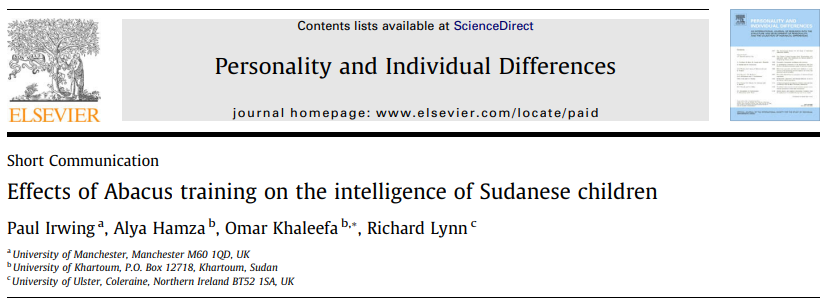

Effects of Abacus training on the intelligence of Sudanese children
The effects of Abacus training in mental computation on intelligence assessed with the standard progressive matrices (SPM) was investigated in a sample of 3185 children aged between 7 and 11 years in Sudan
Introduction
Intelligence is a determinant of a number of desirable outcomes including educational attainment, earnings, health and longevity (Lynn & Vanhanen, 2002, 2006). For this reason many people from Galton (1869) onwards have considered that it would be desirable if intelligence could be increased. There has been considerable research on the problem of how intelligence can be increased and the evidence indicates that this can be achieved by improvements in nutrition (Benton, 2001; Lynn, 1990) and education (Ceci, 1991). Although education appears to improve intelligence the process by which it does this remains problematical. Presumably, education teaches problem solving skills which are used in intelligence tests. To examine this question more precisely we report an experiment designed to test whether Abacus training has a beneficial effect on intelligence in Sudanese children. Abacus training consists of training in mental arithmetic including working memory in which information is stored in working memory while other mental operations are performed, and then retrieved. The training procedure has been described by Hatano (1977) and Hatano and Osawa (1983). Mental arithmetic is required in a number of tests of fluid intelligence such as the Progressive Matrices. It has been shown by Carpenter, Just, and Shell (1990) that the Progressive Matrices is largely a mathematical problem solving test in design format, requiring the application of five mathematical rules involving addition and subtraction and arithmetical and geometrical pro gression. Hence the hypothesis to be examined is that performance on the Progressive Matrices will be improved by Abacus training.